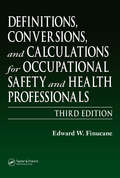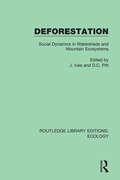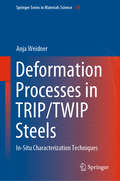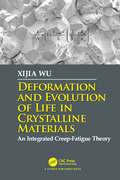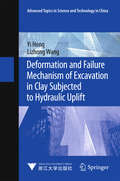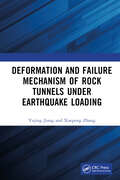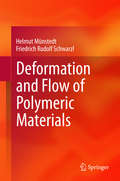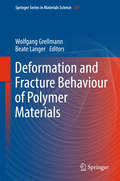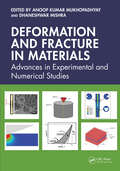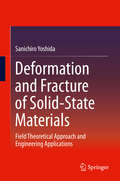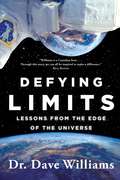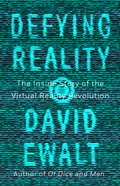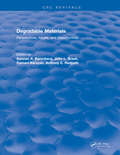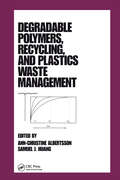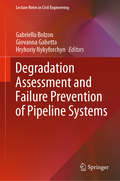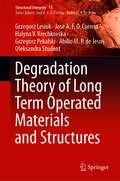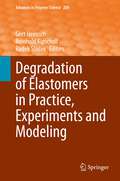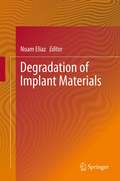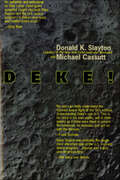- Table View
- List View
Definitions, Concepts and Scope of Engineering Asset Management
by Joseph Mathew Roger Willett Joe E. Amadi-Echendu Kerry BrownDefinitions, Concepts and Scope of Engineering Asset Management, the first volume in this new review series, seeks to minimise ambiguities in the subject matter. The ongoing effort to develop guidelines is shaping the future towards the creation of a body of knowledge for the management of engineered physical assets. Increasingly, industry practitioners are looking for strategies and tactics that can be applied to enhance the value-creating capacities of new and installed asset systems. The new knowledge-based economy paradigm provides imperatives to combine various disciplines, knowledge areas and skills for effective engineering asset management. This volume comprises selected papers from the 1st, 2nd, and 3rd World Congresses on Engineering Asset Management, which were convened under the auspices of ISEAM in collaboration with a number of organisations, including CIEAM Australia, Asset Management Council Australia, BINDT UK, and Chinese Academy of Sciences, Beijing University of Chemical Technology, China. Definitions, Concepts and Scope of Engineering Asset Management will be of interest to researchers in engineering, innovation and technology management, as well as to managers, planners and policy-makers in both industry and government.
Definitions, Conversions, and Calculations for Occupational Safety and Health Professionals
by Edward W. FinucaneStanding firmly on the foundation built by the previous two editions, each a bestseller in its own right, Definitions, Conversions, and Calculations for Occupational Safety and Health Professionals, Third Edition is bound to repeat this success. A multipurpose reference suitable for professionals throughout the field, the book contains virtually ev
Deforestation: Social Dynamics in Watersheds and Mountain Ecosystems (Routledge Library Editions: Ecology #5)
by J. Ives D. C. PittOriginally published in 1988 Deforestation examines deforestation as a major environmental and development problem. It examines the issues of forests being cut in tropical and mountain areas, and how acid rain, pollution and disease wreak havoc in temperate zones. Some of the worst effects of deforestation have been changes in the world’s climate system, erosion and flooding, desertification, wood short-ages and the disappearance of some floral and fauna species. This book challenges the belief that deforestation is due to entirely rapid population growth and agricultural expansion and emphasises the effects of commercial exploitation and poor planning and management. In concludes with a programme for reforestation using agro-forestry, appropriate cottage industries, improved international programmes, local land reforms and community participation.
Deformation Compatibility Control for Engineering Structures
by Hanhua Zhu Zhihui Zhou Mengchong Chen Jianliang DengThis book presents essential methods of deformation compatibility control, and explicitly addresses the implied conditions on the methods' deformation compatibility. Consequently, these conditions can be considered in engineering structure design, while the conditions on stable equilibrium can be taken into account in the design method. Thus, the designed deformation and the actual deformation of the respective structure are approximately identical, guaranteeing both the flexibility of the construction material in force transmission and the equilibrium of force in the structure. Though equilibrium theory in engineering structures has been extensively studied, there has been comparatively little research on compatibility. In the limited researches available, the topics are primarily the theories and assumptions on the deformation compatibility, while few systematic works focus on the mechanical theoretical principles and methods of deformation compatibility control. As such, the flexibility of the construction material in force transmission and the stable equilibrium of the structure as a whole cannot be guaranteed based on these research results. Successfully addressing this important gap in the literature, the book is intended for researchers and postgraduates in engineering mechanics, civil engineering and related areas.
Deformation Processes in TRIP/TWIP Steels: In-Situ Characterization Techniques (Springer Series in Materials Science #295)
by Anja WeidnerThis book demonstrates the potential of novel in-situ experiments, performed on microscopic and macroscopic length scales, for investigating localized deformation processes in metallic materials, particularly their kinetics and the associated evolution of local strain fields. It features a broad methodological portfolio, spanning optical and electron microscopy, digital image correlation, infrared theromgraphy and acoustic emission testing, and particularly focuses on identifying the localized microscopic deformation processes in high-strength/high-ductility CrMnNi TRIP/TWIP (TRansformation Induced Plasticity/TWinning Induced Plasticity) steels. Presenting state-of-the art methodology applied to topical and pertinent problems in materials engineering, this book is a valuable resource for researchers and graduate students working in the field of plasticity and deformation of structural materials.
Deformation and Evolution of Life in Crystalline Materials: An Integrated Creep-Fatigue Theory
by Xijia WuThis book walks you through the fundamental deformation and damage mechanisms. It lends the reader the key to open the doors into the maze of deformation/fracture phenomena under various loading conditions. Furthermore it provides the solution method to material engineering design and analysis problems, for those working in the aerospace, automotive or energy industries. The book introduces the integrated creep-fatigue theory (ICFT) that considers holistic damage evolution from surface/subsurface crack nucleation to propagation in coalescence with internally-distributed damage/discontinuities.
Deformation and Failure Mechanism of Excavation in Clay Subjected to Hydraulic Uplift
by Yi Hong Lizhong WangThis book presents the latest experimental and numerical analysis work in the field of ground deformation and base instability of deep excavations in soft clay subjected to hydraulic uplift. The authors' latest research findings, based on dimensional analyses, well-instrumented full-scale field tests, systematic coupled-consolidation finite element analyses and centrifuge tests are reported. This book shows how to systematically approach a complex geotechnical problem, from identifying existing problems, reviewing literature, to dimensional and numerical analyses, validation through full-scale testing and centrifuge model testing. The methodologies are also introduced as major tools adopted in geotechnical research.
Deformation and Failure Mechanism of Rock Tunnels under Earthquake Loading
by Yujing Jiang Xuepeng ZhangSeismic damage to rock tunnels from recent earthquakes indicates an urgent need for seismic assessment and aseismic design of underground structures. This book offers a comprehensive account of seismic performance and the response of underground structures under earthquake loading, necessary for adequate assessment and design. The book presents research methods for the rate-dependent mechanical behavior of rock and for the seismic behavior of underground structures. It describes analytical solutions to investigate the seismic response of tunnels subjected to seismic waves, toward an improved quantitative understanding of the seismic deformation and failure mechanism in both longitudinal and transversal aspects. A performance-based restoration design criterion and aseismic design are also proposed for future tunnel planning. Includes a detailed case study for the seismic performance assessment of rock tunnels under earthquake loading Explores the relationship between seismic damage to underground structures and ground deformation Covers a range of issues from mechanisms, analysis, assessment and design of both new tunnels and restoration projects The book is ideal for earthquake engineers and researchers, and will also be of interest to contractors, clients, researchers, lecturers, and advanced students working on tunnel engineering.
Deformation and Flow of Polymeric Materials
by Helmut Münstedt Friedrich Rudolf SchwarzlThis book describes the properties of single polymer molecules and polymeric materials and the methods how to characterize them. Molar masses, molar mass distributions and branching structure are discussed in detail. These properties are decisive for a deeper understanding of structure/properties relationships of polymeric materials. This book therefore describes and discusses them in detail. The mechanical behavior as a function of time and temperature is a key subject of the book. The authors present it on the basis of many original results they have obtained in their long research careers. They present the temperature dependence of mechanical properties of various polymeric materials in a wide temperature range: from cryogenic temperatures to the melt. Besides an extensive data collection on the transitions of various different polymeric materials, they also carefully present the physical explanations of the observed phenomena. Glass transition and melting temperatures are discussed, particularly, with their relevance for applications. A comprehensive part of the book deals with properties of polymers in the molten state and their decisive influence on the processing of the materials. The book presents and discusses viscous and elastic properties in detail as a function of molar mass, polydispersity, and branching. This book addresses students of polymer and materials science, as well as other natural sciences. Besides this educational value, it will also serve as a valuable monograph for everyone dealing with polymers and polymeric materials, from research, over development, to applications.
Deformation and Fracture Behaviour of Polymer Materials
by Wolfgang Grellmann Beate LangerThis book covers the most recent advances in the deformation and fracture behaviour of polymer material. It provides deeper insight into related morphology-property correlations of thermoplastics, elastomers and polymer resins. Each chapter of this book gives a comprehensive review of state-of-the-art methods of materials testing and diagnostics, tailored for plastic pipes, films and adhesive systems as well as elastomeric components and others. The investigation of deformation and fracture behaviour using the experimental methods of fracture mechanics has been the subject of intense research during the last decade. In a systematic manner, modern aspects of fracture mechanics in the industrial application of polymers for bridging basic research and industrial development are illustrated by multifarious examples of innovative materials usage. This book will be of value to scientists, engineers and in polymer materials science.
Deformation and Fracture in Materials: Advances in Experimental and Numerical Studies
by Anoop Kumar Mukhopadhyay and Dhaneshwar MishraThis book provides information on the basics of deformation and fracture in materials and on current, state-of-the-art experimental and numerical/theoretical methods, including data-driven approaches in the deformation and fracture study of materials. The blend of experimental test methods and numerical techniques to study deformation and fracture in materials is discussed. In addition, the application of data-driven approaches in predicting material performance in different types of loading and loading environments is illustrated.Features: Includes clear insights on deformation and fracture in materials, with clear explanations of mechanics and defects relating to them Provides effective treatments of modern numerical simulation methods Explores applications of data-driven approaches such as artificial intelligence, machine learning, and computer vision Reviews simple and basic experimental techniques to understand the concepts of deformation and fracture in materials Details modeling and simulation strategies of mechanics of materials at different scales This book is aimed at researchers and graduate students in fracture mechanics, finite element methods, and materials science.
Deformation and Fracture of Solid-State Materials
by Sanichiro YoshidaThis volume introduces a comprehensive theory of deformation and fracture to engineers and applied scientists. Here "comprehensive" means that the theory can describe all stages of deformation from elastic to plastic and plastic to fracturing stage on the same basis (equations). The comprehensive approach is possible because the theory is based on a fundamental physical principle called the local symmetry, or gauge invariance, as opposed to phenomenology. Professor Yoshida explains the gist of local symmetry (gauge invariance) intuitively so that engineers and applied physicists can digest it easily, rather than describing physical or mathematical details of the principle. The author also describes applications of the theory to practical engineering, such as nondestructive testing in particular, with the use of an optical interferometric technique called ESPI (Electronic Speckle-Pattern Interferometry). The book is not a manual of applications. Instead, it provides information on how to apply physical concepts to engineering applications.
Deformation of Three-layer Structural Elements in Thermal Radiation Fields
by Yongtao Lyu Michael Zhuravkov Starovoitov Eduard Denis LeonenkoThis book methodically details the formulations and approaches to solve boundary value problems, which are essential for determining the stress–strain states in three-layer rods and plates subjected to both single and quasi-static variable loads in thermal radiation and force fields. It duly considers the complex influences on the physically nonlinear properties of the materials in each layer. The book offers several innovative analytical solutions and a numerical parametric analysis of the stress–strain scenarios in these structures. It describes the deformation of physically nonlinear media in thermoradiational fields within the small elastic-plastic deformations theory framework. The work explores variational problem-solving methods and the elastic solution method. It presents a formula for calculating the temperature within a three-layer assembly, derived by averaging the thermophysical properties of the materials across the layers' thickness. Additionally, the book includes an analysis of the attenuation of neutron flux as it passes through a three-layer element.
Defying Limits: Lessons from the Edge of the Universe
by Dave WilliamsAn inspirational, uplifting, and life-affirming memoir about passion, resilience and living life to the fullest, from Dr. Dave Williams, one of Canada’s most accomplished astronauts.I had dreamt about becoming an astronaut from the time I watched Alan Shepard launch on the first American sub-orbital flight on May 5, 1961. Eleven days before my seventh birthday, I committed to a new goal: one day, I would fly in outer space. Dr. Dave has led the sort of life that most people only dream of. He has set records for spacewalking. He has lived undersea for weeks at a time. He has saved lives as an emergency doctor, launched into the stratosphere twice, and performed surgery in zero gravity. But if you ask him how he became so accomplished, he’ll say: “I’m just a curious kid from Saskatchewan.” Curious indeed. Dr. Dave never lost his desire to explore nor his fascination with the world. Whether he was exploring the woods behind his childhood home or floating in space at the end of the Canadarm, Dave tried to see every moment of his life as filled with beauty and meaning. He learned to scuba dive at only twelve years old, became a doctor despite academic struggles as an undergraduate, and overcame stiff odds and fierce competition to join the ranks of the astronauts he had idolized as a child. There were setbacks and challenges along the way—the loss of friends in the Columbia disaster, a cancer diagnosis that nearly prevented him from returning to space—but through it all, Dave never lost sight of his goal. And when he finally had the chance to fly among the stars, he came to realize that although the destination can be spectacular, it’s the journey that truly matters. In Defying Limits, Dave shares the events that have defined his life, showing us that whether we’re gravity-defying astronauts or earth-bound terrestrials, we can all live an infinite, fulfilled life by relishing the value and importance of each moment. The greatest fear that we all face is not the fear of dying, but the fear of never having lived. Each of us is greater than we believe. And, together, we can exceed our limits to soar farther and higher than we ever imagined.
Defying Reality: The Inside Story of the Virtual Reality Revolution
by David M. EwaltA fascinating exploration of the history, development, and future of virtual reality, a technology with world-changing potential, written by award-winning journalist and author David Ewalt, stemming from his 2015 Forbes cover story about the Oculus Rift and its creator Palmer Luckey.You’ve heard about virtual reality, seen the new gadgets, and read about how VR will be the next big thing. But you probably haven’t yet realized the extent to which this technology will change the way we live. We used to be bound to a physical reality, but new immersive computer simulations allow us to escape our homes and bodies. Suddenly anyone can see what it’s like to stand on the peak of Mount Everest. A person who can’t walk can experience a marathon from the perspective of an Olympic champion. And why stop there? Become a dragon and fly through the universe. But it’s not only about spectacle. Virtual and augmented reality will impact nearly every aspect of our lives—commerce, medicine, politics—the applications are infinite. It may sound like science fiction, but this vision of the future drives billions of dollars in business and is a top priority for such companies as Facebook, Google, and Sony. Yet little is known about the history of these technologies. In Defying Reality, David M. Ewalt traces the story from ancient amphitheaters to Cold War military laboratories, through decades of hype and failure, to a nineteen-year-old video game aficionado who made the impossible possible. Ewalt looks at how businesses are already using this tech to revolutionize the world around us, and what we can expect in the future. Writing for a mainstream audience as well as for technology enthusiasts, Ewalt offers a unique perspective on VR. With firsthand accounts and on-the-ground reporting, Defying Reality shows how virtual reality will change our work, our play, and the way we relate to one another.
Degradable Materials: Perspectives, Issues, and Opportunities
by Sumner A. BarenbergThis book addresses the fields of biodegradation, environmental degradation, and photochemical degradation. The purpose of the book is to establish guidelines for terminology, nomenclature, characterization techniques and methodology, mechanisms of degradation, standard reference materials, and issues and needs. This is the first scientific book of this nature based on the findings of the world's leading scientists (academic, industrial, and federal) in this field. Hard data is presented and soft data is identified under issues and needs. New areas covered are such topics as: biodegradation with in vivo applications, environmental degradation, including anaerobic, aerobic, characterization techniques and methodology, photochemical degradation, and secondary issues associated with degradation. This publication contains information vital to environmental scientists and engineers, biomaterials scientists, pharmaceutical technologists, and chemists.
Degradable Polymers, Recycling, and Plastics Waste Management
by AlbertssonBased on the International Workshop on Controlled Life-Cycle of Polymeric Materials held in Stockholm, this work examines degradable polymers and the recycling of plastic materials. It highlights recent results on recycling and waste management, including topics such as renewable resources, degradation, processing and products, and environmental is
Degradation Assessment and Failure Prevention of Pipeline Systems (Lecture Notes in Civil Engineering #102)
by Giovanna Gabetta Gabriella Bolzon Hryhoriy NykyforchynThis book presents the results of the research project G5055 'Development of novel methods for the prevention of pipeline failures with security implications,' carried out in the framework of the NATO Science for Peace and Security program, and explores the lifecycle assessment of gas infrastructures. Throughout their service lives, pipelines transporting hydrocarbons are exposed to demanding working conditions and aggressive media. In long-term service, material aging increases the risk of damage and failure, which can be accompanied by significant economic losses and severe environmental consequences. This book presents a selection of complementary contributions written by experts operating in the wider fields of pipeline integrity; taken together, they offer a comprehensive portrait of the latest developments in this technological area.
Degradation Theory of Long Term Operated Materials and Structures (Structural Integrity #15)
by José A.F.O. Correia Grzegorz Lesiuk Halyna V. Krechkovska Grzegorz Pekalski Abílio M.P. Jesus Oleksandra StudentThis book addresses the fatigue behavior of riveted connections from ancient Portuguese metallic bridges as well as the fatigue crack propagation behavior of related materials. Some examples of the fatigue assessment of long-term operated metallic bridges are presented and discussed. The phenomena of degradation is discussed in chapter 2, devoted to the material aspects of the Degradation Theory. Applications of structural integrity assessment/ corrosion aspects are discussed in chapter 3; case studies in chapter 4 and fatigue and fracture test results in chapter 5.
Degradation of Elastomers in Practice, Experiments and Modeling (Advances in Polymer Science #289)
by Gert Heinrich Reinhold Kipscholl Radek StočekThis volume describes new insights into the main aspects of rubber degradation by material’s fatigue, wear and aging evolution, as well as their impact on mechanical rubber properties. It provides a thorough state-of-art explanation of the essential chemical, physical and mechanical principles as well as practices of material characterization for wear prediction, and to convey or define novel strategies and procedures of planning effective wear test programs. The initiating factors of abrasion, the development of surface abrasion on sharp and blunt tracks (so called cutting and chipping) and the influence of smear and lubricants is also summarized. The volume is of interest to research scientists in related fields from academia and industry.
Degradation of Implant Materials
by Noam EliazThis book reviews the current understanding of the mechanical, chemical and biological processes that are responsible for the degradation of a variety of implant materials. All 18 chapters will be written by internationally renowned experts to address both fundamental and practical aspects of research into the field. Different failure mechanisms such as corrosion, fatigue, and wear will be reviewed, together with experimental techniques for monitoring them, either in vitro or in vivo. Procedures for implant retrieval and analysis will be presented. A variety of biomaterials (stainless steels, titanium and its alloys, nitinol, magnesium alloys, polyethylene, biodegradable polymers, silicone gel, hydrogels, calcium phosphates) and medical devices (orthopedic and dental implants, stents, heart valves, breast implants) will be analyzed in detail. The book will serve as a broad reference source for graduate students and researchers studying biomedicine, corrosion, surface science, and electrochemistry.
Degradation, Stabilization, and Recycling of Packaging Materials
by Susan E. Selke Muhammad Rabnawaz Ian WymanPractical guidance to sustainable packaging and its challenges with analysis of various packaging materials and their interactions with different environments Degradation, Stabilization, and Recycling of Packaging Materials analyzes packaging materials and their interactions with different environments, discussing the degradation processes of different materials like plastics, wood, paper, glass, and metal, providing specific strategies to address these degradation processes, and exploring solid waste management, recent developments in recycling, and the principles of eco-friendly packaging design. Organized into two parts, the first section of this book provides a comprehensive examination of how environmental factors such as heat, shear, light, air, packaged products, and stress affect packaging materials, focusing on the chemistry of their deterioration and stabilization methods. The second section explores solid waste management, recent developments in recycling, and key principles of eco-friendly packaging design, culminating in an extensive discussion of legal and regulatory aspects. The book includes case studies and problem sets in each chapter, with solutions to the problems in an appendix in the back of the book. Written by a team of highly qualified authors, Degradation, Stabilization, and Recycling of Packaging Materials includes discussion on: Structure of tinplate and tin-free steel, corrosion in lacquered cans, and effects of producing, processing, and storing metalsRecyclable versus repulpable paper, uses of recycled papers, wet-strength papers, non-wood fibers as paper sources, and contamination issues with paper recyclingPlastic recycling rates, plastic scrap exports in the US and abroad, chemical versus mechanical plastic recycling, hydrocracking of plastics, and PE and PET recyclingLightweight glass bottles, strategies to modify or strengthen glass, and the real recyclability of glass Presenting advanced technical knowledge that demystifies the sustainable packaging landscape Degradation, Stabilization, and Recycling of Packaging Materials is a critical resource for researchers, students, and industry professionals in the field of materials science and packaging to evaluate challenges related to solid waste and devise effective disposal strategies.
Degrees Kelvin: A Tale Of Genius, Invention, And Tragedy
by David LindleyLORD KELVIN. In 1840, a precocious 16-year-old by the name of William Thomson spent his summer vacation studying an extraordinarily sophisticated mathematical controversy. His brilliant analysis inspired lavish praise and made the boy an instant intellectual celebrity. <P> As a young scholar William dazzled a Victorian society enthralled with the seductive authority and powerful beauty of scientific discovery. At a time when no one really understood heat, light, electricity, or magnetism, Thomson found key connections between them, laying the groundwork for two of the cornerstones of 19th century science -- the theories of electromagnetism and thermodynamics. Charismatic, confident, and boyishly handsome, Thomson was not a scientist who labored quietly in a lab, plying his trade in monkish isolation. When scores of able tinkerers were flummoxed by their inability to adapt overland telegraphic cables to underwater, intercontinental use, Thomson took to the high seas with new equipment that was to change the face of modern communications. And as the world's navies were transitioning from wooden to iron ships, they looked to Thomson to devise a compass that would hold true even when surrounded by steel. <P> Gaining fame and wealth through his inventive genius, Thomson was elevated to the peerage by Queen Victoria for his many achievements. He was the first scientist ever to be so honored. Indeed, his name survives in the designation of degrees Kelvin, the temperature scale that begins with absolute zero, the point at which atomic motion ceases and there is a complete absence of heat. <P> Sir William Thomson, Lord Kelvin, was Great Britain's unrivaled scientific hero. But as the century drew to a close and Queen Victoria's reign ended, this legendary scientific mind began to weaken. He grudgingly gave way to others with a keener, more modern vision. But the great physicist did not go quietly. With a ready pulpit at his disposal, he publicly proclaimed his doubts over the existence of atoms. He refused to believe that radioactivity involved the transmutation of elements. And believing that the origin of life was a matter beyond the expertise of science and better left to theologians, he vehemently opposed the doctrines of evolution, repeatedly railing against Charles Darwin. Sadly, this pioneer of modern science spent his waning years arguing that the Earth and the Sun could not be more than 100 million years old. And although his early mathematical prowess had transformed our understanding of the forces of nature, he would never truly accept the revolutionary changes he had helped bring about, and it was others who took his ideas to their logical conclusion. <P> In the end Thomson came to stand for all that was old and complacent in the world of 19th century science. Once a scientific force to be reckoned with, a leader to whom others eagerly looked for answers, his peers in the end left him behind -- and then meted out the ultimate punishment for not being able to keep step with them. For while they were content to bury him in Westminster Abbey alongside Isaac Newton, they used his death as an opportunity to write him out of the scientific record, effectively denying him his place in history. Kelvin's name soon faded from the headlines, his seminal ideas forgotten, his crucial contributions overshadowed. Destined to become the definitive biography of one of the most important figures in modern science, Degrees Kelvin unravels the mystery of a life composed of equal parts triumph and tragedy, hubris and humility, yielding a surprising and compelling portrait of a complex and enigmatic man.
Deke!: From Mercury To The Shuttle
by Michael Cassutt Donald K. SlaytonDeke Slayton was one of the first seven Mercury astronauts--and he might have been the first American in space. Instead, he became the first chief of American Astronaut Corps. It was Deke Slayton who selected the crews who flew the Gemini, Apollo, and Skylab missions. It was Deke Slayton who made Neil Armstrong the first man on the moon.Deke! is Deke Slayton's' story--told in his own words and in the voices of the men and women who worked with him and knew him best. Deke Slayton's knowledge of how the .S. manned space program worked is the missing piece of every space buff's puzzle. Now, after decades of silence, he tells his priceless stories of those years when American was engaged in the greatest voyage of exploration in human history.At the Publisher's request, this title is being sold without Digital Rights Management Software (DRM) applied.
Delamination in Wood, Wood Products and Wood-Based Composites
by Voichita BucurIn the last quarter century, delamination has come to mean more than just a failure in adhesion between layers of bonded composite plies that might affect their load-bearing capacity. Ever-increasing computer power has meant that we can now detect and analyze delamination between, for example, cell walls in solid wood. This fast-moving and critically important field of study is covered in a book that provides everyone from manufacturers to research scientists the state of the art in wood delamination studies. Divided into three sections, the book first details the general aspects of the subject, from basic information including terminology, to the theoretical basis for the evaluation of delamination. A settled terminology in this subject area is a first key goal of the book, as the terms which describe delamination in wood and wood-based composites are numerous and often confusing. The second section examines different and highly specialized methods for delamination detection such as confocal laser scanning microscopy, light microscopy, scanning electron microscopy and ultrasonics. Ways in which NDE (non-destructive evaluation) can be employed to detect and locate defects are also covered. The book's final section focuses on the practical aspects of this defect in a wide range of wood products covering the spectrum from trees, logs, laminated panels and glued laminated timbers to parquet floors. Intended as a primary reference, this book covers everything from the microscopic, anatomical level of delamination within solid wood sections to an examination of the interface of wood and its surface coatings. It provides readers with the perspective of industry as well as laboratory and is thus a highly practical sourcebook for wood engineers working in manufacturing as well as a comprehensively referenced text for materials scientists wrestling with the theory underlying the subject.

